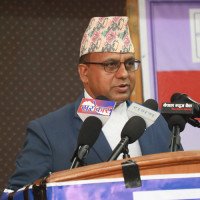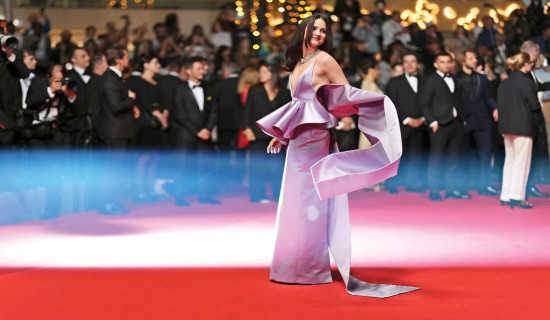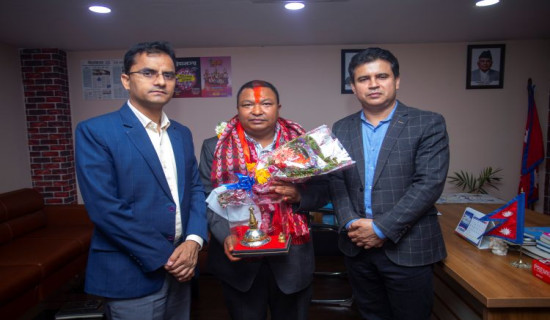- Monday, 26 May 2025
Cannes Film Festival organises red carpet rally
Paris, May 19: Hollywood legend Francis Ford Coppola brought his decades-in-the-making “Megalopolis” to the Cannes Film Festival and Cambodia’s Rithy Panh delivered another sobering chronicle of the Khmer Rouge genocide on a day that saw dozens of women join France’s #MeToo icon Judith Godrèche on the red carpet to denounce sexual violence and impunity.
After two days of rain showers and soggy screenings, the sunshine finally returned to the French Riviera on Thursday morning – just in time for a red-carpet tribute to the women who have placed this year’s festival firmly under the sign of #MeToo.
The tribute naturally featured Judith Godrèche, the French actor and director at the heart of France’s belated reckoning with rampant sex abuse in the film industry.
She was joined on the red carpet by dozens of women who took part in her short film “Moi Aussi” (“Me Too” in French), a choral work aimed at encouraging victims of abuse to speak out about their personal trauma. Together, they posed for a group photo on the steps leading up to the Palais des Festivals, with hands covering their mouths. Clare, one of the women accompanying Godrèche, spoke of drawing strength and solace from the experience.
“We’re united because we’ve all been victims of abuse,” she said. “We’re no longer hiding. We’re like the film stars. We walk the red carpet now.”
Godrèche praised the Cannes Film Festival for welcoming her and her cast on the red carpet, saying she hoped the film would help progress conversation on the matter. Thursday’s group photo added yet another powerful image to a 77th Cannes edition that has so far championed female icons of film and showcased movies focused on stories about women.
Even as Godrèche led the red-carpet rally, underslept festivalgoers stumbled out of Cannes’ many early-morning screenings, a chance to catch up on the some of the movies that made headlines the night before.
Some opted for George Miller’s furiously paced “Furiosa”, the latest instalment of his “Mad Max” franchise. Others chose Magnus von Horn’s “The Girl with the Needle”, a grim but beguiling tale of women living on the margins in post-World War I Denmark, which earned rave reviews from English-speaking critics and a cooler reception from the French.
Others, still, went for a screening of Rithy Panh’s “Rendez-vous avec Pol Pot” (“Meeting with Pol Pot”), the Cambodian director’s latest, harrowing exploration of the massacres perpetrated by the Khmer Rouge in his home country.
Panh, who won the Un Certain Regard prize in 2013 for “The Missing Image”, has spent a lifetime piecing together fragments of the tragedy that befell Cambodia between 1975 and 1979, when Pol Pot’s regime reigned over the former French colony in total isolation. In an interview on a terrace of the sprawling Palais des Festivals in Cannes, he stressed the importance of passing on the memory of a genocide that went unspoken for years.
“When you see the horror and survive, you have to pass on the message,” said the veteran director, who was 13 when the Khmer Rouge drove his family from Phnom Penh.
His latest work is based on American journalist Elizabeth Becker’s book “When the War Was Over: Cambodia and the Khmer Rouge Revolution”. It follows a trio of French journalists and intellectuals as they take part in a rigidly scripted press trip in the renamed Democratic Kampuchea in the hope of securing an interview with Pol Pot.
Under close guard, the trio are paraded past Potemkin villages and rural “cooperatives” supposedly showcasing the merits of a revolution that drove more than two million urban dwellers from their homes with the aim of setting up a peasant utopia.
“The revolution must wipe the slate clean,” says the trio’s guide, justifying a brutal experiment that claimed an estimated 1.8 million lives through mass executions, famine and disease.
The film explores the limits and dangers of journalism under a genocidal regime bent on “erasing 2,000 years of history” without leaving a trace.
“The reporters have no grip on this invisible mass murder,” said French-Swiss actress Irène Jacob, whose character Lise Delbo is based on Becker. “That’s why Lise is constantly jotting down notes, terrified at the idea of missing out on the real story.”
Panh refrains from shooting the horror that is concealed from the three visitors. Instead, he uses detailed dioramas populated by clay figurines that stand in for the genocide’s “missing images” – a device he previously put to use in the eponymous 2013 film. His film also probes Western misconceptions of the Khmer Rouge, particularly among their ideological allies who remained blissfully unaware of the mass murders that were taking place – or simply refused to believe them.
Panh’s Pol Pot reads books by Jean-Jacques Rousseau, quotes Danton and listens to French revolutionary songs. He evokes the colonial roots of the tragedy perpetrated by the Khmer Rouge, whose chief ideologues attended France’s top universities.
Building on Panh’s past works, the film sheds further light on the ideological workings of genocidal regimes, obsessed with routing out human flaws and society’s “enemies within”.
“The revolution advances under the whip of the counter-revolution,” explains the trio’s guide, stressing the need to “eliminate all parasites”.
“Better no humans than imperfect ones,” adds Pol Pot, also known as “Brother Number One”, when the film’s titular rendez-vous finally takes place. “Past revolutions failed because they sought to compromise with human weaknesses.”
When Vietnamese troops marched into Phnom Penh in January 1979, finally toppling Pol Pot’s bloody regime, Francis Ford Coppola was racing to finish a sprawling Vietnam War epic that would go on to make film history in Cannes later that year. (AFP)















